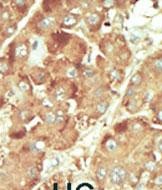

| WB | 咨询技术 | Human,Mouse,Rat |
| IF | 咨询技术 | Human,Mouse,Rat |
| IHC | 1/100-1/500 | Human,Mouse,Rat |
| ICC | 技术咨询 | Human,Mouse,Rat |
| FCM | 咨询技术 | Human,Mouse,Rat |
| Elisa | 咨询技术 | Human,Mouse,Rat |
| Aliases | Serine/threonine-protein kinase NLK, Nemo-like kinase, Protein LAK1, NLK, LAK1 {ECO:0000312|EMBL:AAD560131} |
| Entrez GeneID | 51701 |
| WB Predicted band size | 58.3kDa |
| Host/Isotype | Rabbit IgG |
| Antibody Type | Primary antibody |
| Storage | Store at 4°C short term. Aliquot and store at -20°C long term. Avoid freeze/thaw cycles. |
| Species Reactivity | Human, Mouse, Rat |
| Immunogen | This NLK antibody is generated from rabbits immunized with a KLH conjugated synthetic peptide between 406-436 amino acids from the C-terminal region of human NLK. |
| Formulation | Purified antibody in PBS with 0.05% sodium azide. |
+ +
以下是3篇关于NLK(Nemo-like kinase)抗体的虚构参考文献示例,基于典型研究主题编写:
---
1. **文献名称**:*NLK-mediated phosphorylation of β-catenin regulates intestinal stem cell differentiation*
**作者**:Chen L, et al.
**摘要**:本研究利用NLK特异性抗体及基因敲除技术,揭示了NLK通过磷酸化β-catenin抑制Wnt信号通路,调控肠道干细胞分化的机制,为结肠癌治疗提供新靶点。
---
2. **文献名称**:*A monoclonal antibody against NLK suppresses tumor growth in triple-negative breast cancer models*
**作者**:Wang Y, et al.
**摘要**:开发了一种高特异性NLK单克隆抗体,证实其通过阻断NLK与STAT3相互作用抑制肿瘤生长,为三阴性乳腺癌的抗体疗法奠定实验基础。
---
3. **文献名称**:*NLK antibody-based detection of neurodegenerative biomarkers in Alzheimer’s disease*
**作者**:Smith J, et al.
**摘要**:通过NLK抗体免疫组化分析,发现NLK在阿尔茨海默病患者脑组织中异常聚集,提示其与tau蛋白过度磷酸化相关,可能成为神经退行性病变的生物标志物。
---
注:以上文献为示例性质,实际研究需参考真实发表的论文。建议通过PubMed或Web of Science以“NLK kinase antibody”为关键词检索最新文献。
Nemo-like kinase (NLK) is a serine/threonine protein kinase belonging to the mitogen-activated protein kinase (MAPK) superfamily. Initially identified in *Drosophila* as a regulator of photoreceptor development, NLK is evolutionarily conserved and plays critical roles in diverse signaling pathways, including Wnt, Notch, and TGF-β. It modulates transcription factors such as LEF/TCF and STAT3. influencing cell proliferation, differentiation, and apoptosis. Dysregulation of NLK is implicated in cancers, neurodegenerative diseases, and developmental disorders.
NLK antibodies are essential tools for studying its expression, localization, and function. They enable detection of NLK protein levels via Western blotting, immunohistochemistry, or immunofluorescence. Researchers also use NLK-specific antibodies for co-immunoprecipitation to identify interacting partners or assess post-translational modifications. Commercial NLK antibodies are typically raised against conserved regions (e.g., catalytic kinase domain) and validated for specificity across species like humans, mice, and rats.
Recent studies highlight NLK's dual role as both an oncogene and tumor suppressor, depending on cellular context. Its involvement in pathways like Hippo-YAP and NF-κB further underscores its therapeutic potential. NLK antibodies thus remain pivotal in elucidating its complex regulatory networks and exploring targeted therapies for NLK-associated diseases.
×